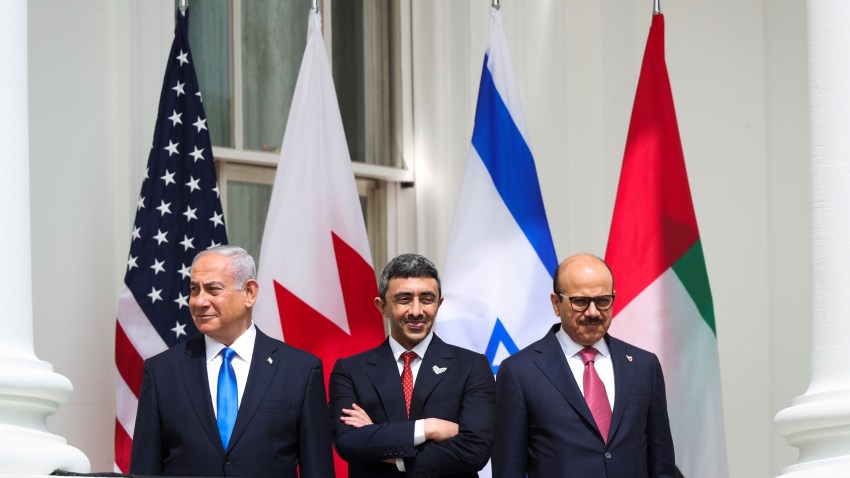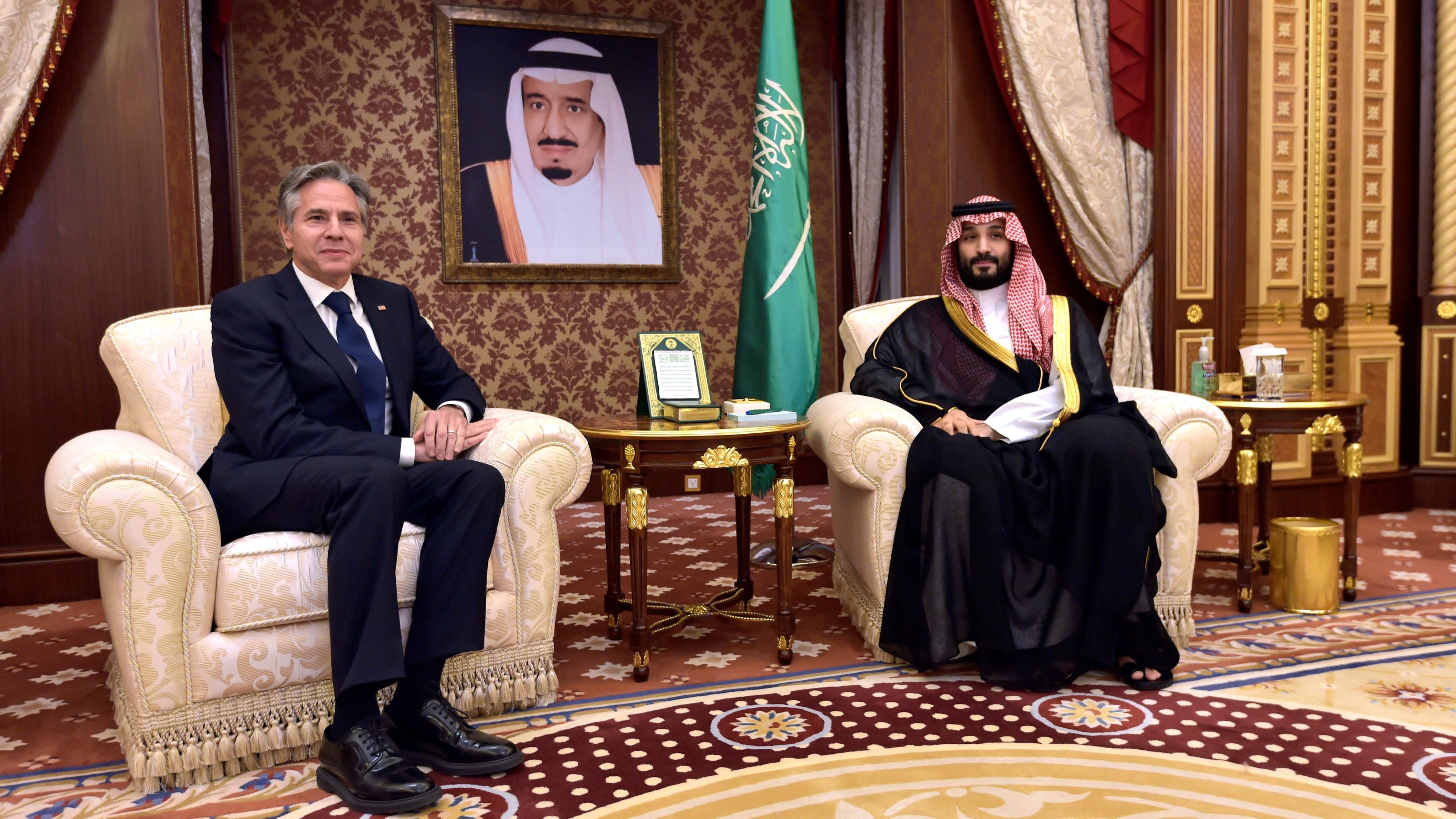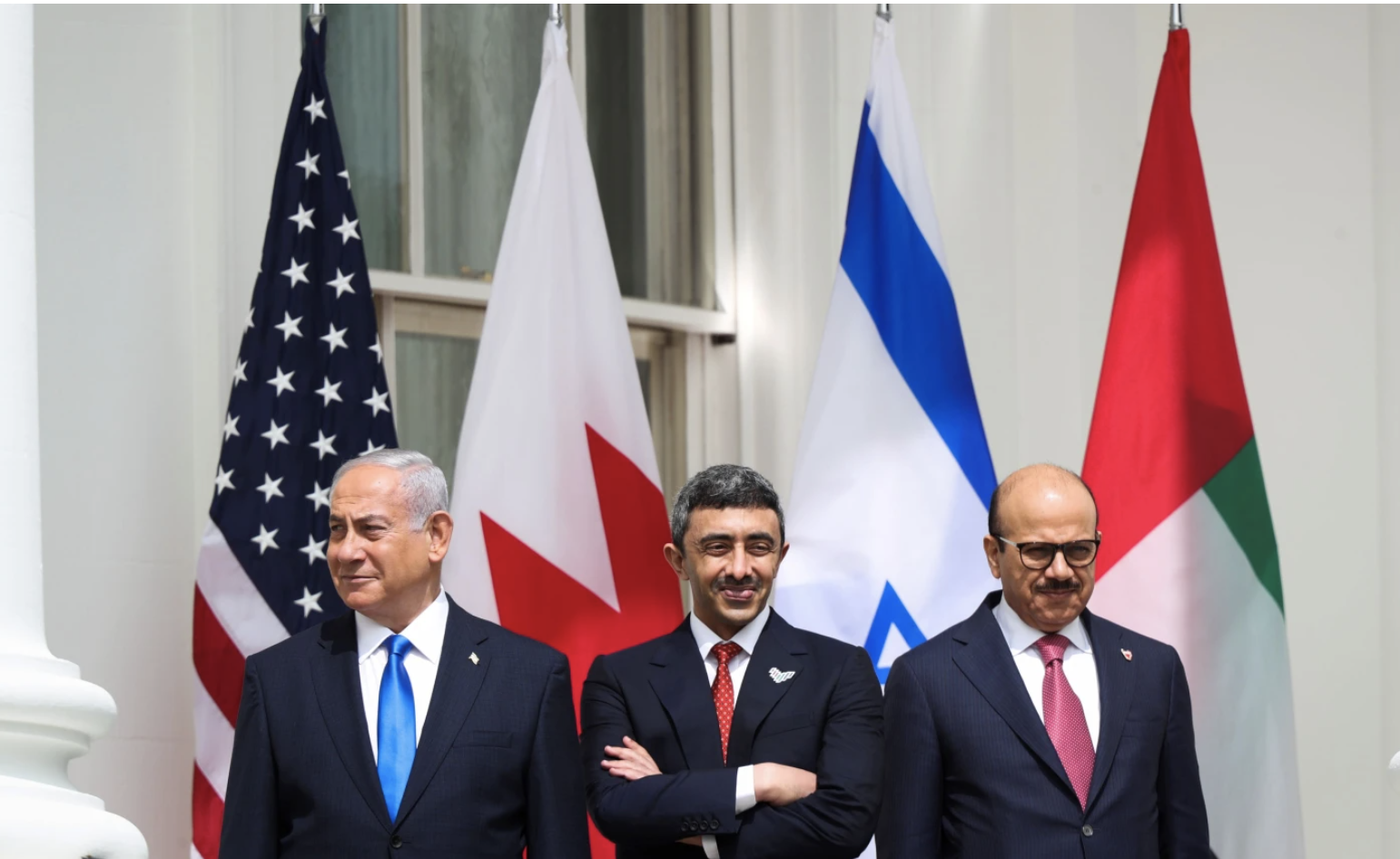
In early June, U.S. Secretary of State Antony Blinken traveled to Saudi Arabia, where he met with the kingdom’s de facto ruler, Saudi Crown Prince Mohamed Bin Salman. Blinken’s trip was part of an effort to repair bilateral ties, which have frayed in the two years since U.S. President Joe Biden took office, due to tensions over Saudi Arabia’s human rights abuses as well as its refusal to increase oil production to bring down global prices.
But while improving the tenor of bilateral relations was a major focus of the trip, Blinken also repeatedly mentioned both before and after he arrived in Riyadh the Biden administration’s desire to expand the Abraham Accords—the series of normalization agreements between Israel and Arab countries launched in 2020 by the administration of former President Donald Trump. So far the United Arab Emirates, Bahrain, Morocco and Sudan have signed the accords. Though he did not say so explicitly, Blinken was clearly referring to what might be characterized as the “holy grail” of U.S. policy in the Middle East: getting Riyadh to follow suit and normalize ties with Israel.
That effort is underpinned by the general consensus in Washington that the accords have been an overwhelming success and that expanding them to include Saudi Arabia will only increase their benefits. But that might be an overly rosy assessment.
To more accurately evaluate both the current state of the accords and their future prospects, it is important to appreciate that improving relations with Israel was at best a secondary objective for the Arab signatories. The Abraham Accords had symbolic value, as they demonstrated Israel’s diplomatic recognition by its Arab neighbors after decades of rejection. However, the agreements do not augur popular Arab acceptance of Israel and certainly fall short of the Israel-centered regional cooperation against Iran for which U.S. and Israeli policymakers were hoping. Finally, Israel’s optimism that the accords have definitively sidelined the Palestinian issue, allowing Israel to expand its ties with its Arab neighbors without taking concrete steps toward a two-state solution, appears highly dubious.
How It Started
From the outset, all the Arab signatories of the Abraham Accords saw the agreements as the means to achieve a more important and immediate objective, usually involving a concrete commitment from the United States. When the UAE signed the initial Abraham Accords normalizing relations with Israel in September 2020, it had already been coordinating policies with Israel to contain Iran’s regional ambitions for several years; in many ways the accords simply formalized that existing relationship. Abu Dhabi indicated that signing the accord was intended to prevent Israel from annexing portions of the West Bank, which it was on the verge of doing at the time with U.S. approval. In the case of Bahrain, which is highly dependent politically and economically on Saudi Arabia, regional observers assessed that Riyadh had green-lighted Manama’s participation to send a message to Tehran that Saudi Arabia could soon also join the accords if Iran did not deescalate its regional aggression against its Sunni Arab neighbors.
Israel clearly saw the Abraham Accords as a way to create a regional anti-Iran coalition through cooperation with Gulf Arab states. In this regard, the accords have been a disappointment.
In December 2020, Morocco normalized relations with Israel in exchange for U.S. recognition of Rabat’s control over the disputed Western Sahara region. And in January 2021, Sudan joined the Abraham Accords after the Trump administration agreed to remove Sudan from the U.S. State Department list of “state sponsors of terrorism” and provide a $1 billion loan to help Sudan clear its debts to the World Bank.
Since then, the focus of attention has been on whether Saudi Arabia would follow suit. But despite some thawing in the Saudi-Israel relationship, including overflight of Saudi territory by Israeli civil aviation and direct flights by Muslim pilgrims from Israel to Mecca, Saudi Arabia has reportedly articulated specific demands to Washington for normalizing its relationship with Israel. These include U.S. security guarantees, decreased restrictions on arms sales and assistance in developing a civilian nuclear program. As even Blinken acknowledged before his June visit to the kingdom, during which no progress was made on a Saudi-Israeli deal, “We have no illusions that this can be done quickly or easily.”
How It’s Going
Of the Abraham Accords already in effect, the one between Israel and the UAE is the most successful to date. It has enabled expanded trade, based on the first free-trade agreement Israel has signed with an Arab state; technology transfers; cooperation in the financial, energy and water security sectors; and extensive discussions about regional security cooperation. Nonetheless, the UAE has not embraced Israel’s strategy of isolating Iran, opting instead to return its ambassador to Tehran in September 2022 and applauding the recent Chinese-brokered rapprochement between Riyadh and Tehran.
Meanwhile, on the Palestinian issue, Abu Dhabi has publicly criticized Israel’s policy on settlements, circulating a draft United Nations Security Council resolution in February reaffirming that Israeli settlements and annexation in the Palestinian territories—including East Jerusalem—constitute a flagrant violation of international law. The UAE, joined by Bahrain, publicly criticized the recent escalation of violence in the Occupied Territories as well as provocations by senior officials of Prime Minister Benjamin Netanyahu’s far-right government. It remains to be seen whether the UAE can continue to isolate its economic relationships with Israel from the clearly downward spiral in Palestinian-Israeli dynamics.
Based in part on historical ties and previously cordial relations, Morocco’s relationship with Israel has prospered since the 2020 deal. The two sides signed a defense cooperation agreement in November 2021. Also, since the 2020 signing of the accord, Rabat has purchased military equipment and cybersecurity products from Israeli firms. Meanwhile, reopened direct air routes allowed some 200,000 Israelis to visit Morocco since the accords were signed, a substantial increase from pre-pandemic numbers. And a trade agreement signed in February 2022 helped bilateral trade grow by a third in 2022.
However, King Mohamed VI has also had to defend his foreign policy against public accusations of undermining the Palestinian cause from elements of Rabat’s political class and civil society. Moreover, the new bilateral relationship largely represents continuity with what preceded the Abraham Accords. As former Israeli deputy national security adviser Chuck Freilich stressed, the “understanding with Morocco opens a new era, but it does not substantially change a security cooperation that already existed de facto.”

Since Israel and Bahrain agreed to establish formal diplomatic ties in 2020, the two countries have signed dozens of memoranda of understanding to support future cooperation in the areas of intelligence, military-to-military relations and industrial collaboration, among others. However, the actual scope of cooperation will continue to be subject to Saudi support or constraint and Manama’s vulnerability on the Palestinian issue. Bahraini opposition figures have criticized and protested against the decision to normalize ties with Israel. Consequently, Manama—like the other signatories to the Abraham Accords—has been public in its criticism of Israeli practices in the Palestinian territories. Bahrain’s ambassador to the United States, Shaykh Abdullah bin Rashid Al Khalifa, indicated that “the more challenging [the Palestinian issue] becomes, the bigger the risk for us.”
Whatever its potential was, the accord between Israel and Sudan was delayed by the interruption of that country’s transition to a civilian government after the 2019 overthrow of former dictator Omar al-Bashir. It has now been scuttled by the outbreak of fighting since April between the Sudanese armed forces and the Rapid Support Forces paramilitary group. Amid international pressure to prevent a broader civil war, the Israel-Sudan signing ceremony that was expected to take place after the transfer of power to a civilian government in Khartoum is on indefinite hold.
Where It’s Headed
For Israel, the goal of signing the Abraham Accords was twofold. First, it was an extension of Israel’s ongoing efforts to contain Iran through international sanctions and diplomatic isolation, as well as a credible military threat, particularly with regard to Iran’s nuclear program. Israel clearly saw the Abraham Accords—including a potential agreement with Saudi Arabia—as a way to create a regional anti-Iran coalition through cooperation with Gulf Arab states. In this regard, the accords have been a disappointment.
Israeli officials can’t help but be concerned by the recently announced process of normalization between Saudi Arabia and Iran. Although the ultimate success of the Saudi-Iranian rapprochement remains uncertain, it clearly demonstrates that Riyadh—along with its Gulf partners—is pursuing options for defusing tensions with Tehran to complement any role that relations with Israel might play in balancing against Iran.
The move to thaw ties with Tehran also reflects Riyadh’s efforts to adjust to the reality of Washington’s continuing downsizing of its role in the Middle East, a development that Israeli leaders find especially concerning as well. But the fact that the Saudi-Iranian agreement was announced on the heels of a major rocket attack on Israel from Iran-backed groups in Gaza, Lebanon and Syria demonstrates that attacks against Israel by Iran’s allies will not be an obstacle to Riyadh’s rapprochement with Tehran. Saudi Arabia’s recent decision to host a Hamas delegation, after years of friction, can only add to Israel’s anxiety.
This leads to Israel’s second goal in signing the Abraham Accords: to demonstrate that normalization with its Arab neighbors could be decoupled from the Palestinian issue. But as already indicated, that is at best a premature conclusion and at worst a potentially dangerous illusion. In March, for instance, the Negev Forum—an outgrowth of the Abraham Accords comprising Israel, the UAE, Bahrain, Egypt, Morocco and the U.S.—was delayed due to tensions between Israel and Palestinians. Morocco, which was due to host the gathering, ultimately canceled it in protest of Israeli steps to expand West Bank settlements.
However Arab governments may feel about the value of cooperation with Israel, their publics continue to support the Palestinians and blame Israel for failure to achieve peace.
Moreover, the Saudis are unlikely to be silent on the Palestinian issue in pursuing normalization. Last year, Saudi Foreign Minister Adel al-Jubeir underscored that the 2002 Arab Peace Initiative—under which the Arab nations offered to normalize ties with Israel in return for Palestinian statehood—calls for peace between Israel and the Arab states “at the end of the [Israel-Palestine negotiating] process, not at the beginning.”
The tensions between Israel’s new far-right government and the Palestinians cannot improve this picture. As Daniel Shapiro, a former U.S. ambassador to Israel, testified before a congressional subcommittee in March, heightened tensions and further moves away from a two-state solution will make it harder to expand the Abraham Accords to new members and may dampen support for the accords in existing member states.
Finally, however Arab governments may feel about the value of cooperation with Israel, their publics continue to support the Palestinians and blame Israel for failure to achieve peace. Israel’s continued occupation, military operations in the Palestinian territories and habitual infliction of civilian casualties will raise the political cost for Arab leaders of normalization with Israel. Incidents like the Israeli security forces’ recent attacks on Muslim worshippers in the Al-Asqa Mosque will keep popular focus on Palestinian suffering rather than on the regional geopolitics that their governments may be considering.
Moreover, as time goes on, the Abraham Accords are becoming less popular on the streets of Israel’s new partners. Washington Institute polling showed 45 percent of Bahrainis holding very or somewhat positive views of the agreements in November 2020. That support had eroded to 20 percent by March of this year. The trend is the same in the UAE, where the 49 percent of the country that disapproved of the Abraham Accords in 2020 has grown to over two-thirds as of this spring. And only 31 percent of Moroccans favor normalization, according to Arab Barometer.
Ultimately, the Abraham Accords were less than was promised at the time of their signing. Despite initial optimism in Israel, they have not produced more normalization agreements with other Arab countries. Even those Gulf states that have long maintained informal relations with Israel, like Oman and Qatar, have thus far declined to follow the UAE and Bahrain. Saudi Arabia’s demands for doing so suggest it will be quite some time before Riyadh joins.
As the U.S. seeks to prioritize foreign policy challenges outside the Middle East, the effort to leave the region’s greatest threat—Iran—in Israel’s hands has simply failed. In particular, the Gulf states that felt the greatest threat from Iran worked to mitigate the risks via diplomacy. And while Israel is less isolated in the region and there has been some improvement in the quality of its diplomatic and economic relationships with its Arab neighbors, those advances remain vulnerable due to Arab publics’ negative views of Israel, particularly with regard to the Palestinian issue.
On signing the Abraham Accords, Netanyahu proclaimed that “… this is not only a peace between leaders, it’s a peace between peoples.” Three years on, however, the accords are at best little more than a peace between governments, and at worst a papering over of problems that will not go away for being ignored.
(Amir Asmar was a senior executive and longtime Middle East analyst in the U.S. Department of Defense. The statements of fact, opinion or analysis expressed in this article are strictly the author’s and do not reflect the official policy or position of the Defense Department or the U.S. government. Review of the material does not imply Defense Department or U.S. government endorsement of factual accuracy or opinion.)




COMMENTS